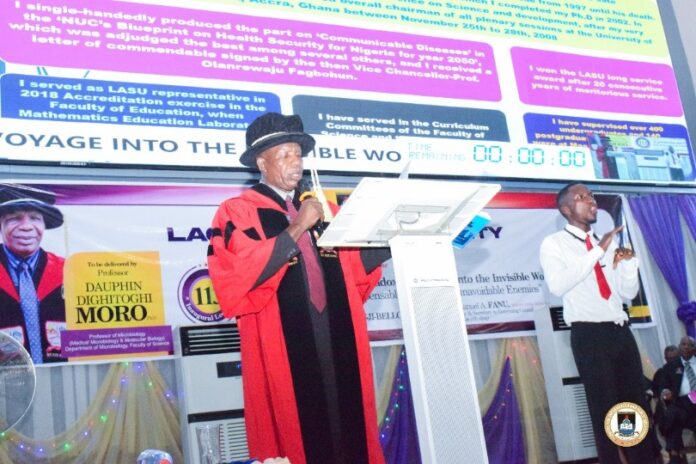A Professor of Microbiology, Department of Microbiology, Faculty of Science, Lagos State University (LASU), Ojo, Prof. Dauphin Moro has urged the government to invest adequately in disease monitoring and surveillance so as to minimize the myriads of infections that are endemic in Nigeria.
He stated this while delivering the university’s 113rd inaugural lecture titled: ‘A Providential and Paradoxical Voyage into the Invisible World: Microorganisms as Indispensable Friends and Unavoidable Enemies’ on Tuesday.
He also advised on the need for Nigeria to venture into production of vaccines by engaging medical microbiologists rather than depending on imported vaccines from variants alien to the nation’s domestic infections.
“Nigerian universities should give priority attention to Research, Development and Innovation (RDI) through proper funding, exposure, and university grants, which will enhance economic, social and infrastructural development of the country, thus boosting internally generated revenue.”
He explained that microorganisms are anywhere and everywhere as they can survive even in extreme environments which are very difficult or too hostile for other organisms including human beings to survive, and this appears as a mystery to humanity.
Pointing to microbes as indispensable friends, Prof. Moro disclosed that over several millennia of evolution, humans have developed an intimate and very complex relationship with the “World of Microorganisms”. “Some of these microbes, generally called normal flora, make the human body their permanent home while others come to rest there temporarily but without harm.
“They perform special functions by occupying specific niches in and on our body surfaces by warding off pathogens and simultaneously amplifying the effectiveness of our immune system.
“Life itself would therefore be meaningless where these advantages derivable only from microbes are unavailable,” he added.
Prof. Moro however stated that the substantial threat posed to man and public health by multiple drug resistant microbes may result in several epidemics and pandemics, with attendant high death rates and usual economic catastrophic, like bubonic plague, measles and quite lately the COVID-19 pandemic.
He revealed that man in his genuine attempts at eradicating microbial diseases has made positive attempts at controlling and preventing most infections by production and use of vaccines.
The lecturer however said Nano particles are a potential tool to combat multidrug resistant bacteria, targeting specific microbial pathogens.
According to him, proper use of antimicrobial agents in man and animals, with antimicrobial stewardship may greatly reduce the spread of antimicrobial resistance, promote responsible antibiotic use, monitor resistance patterns and develop effective treatment guidelines for communicable diseases globally.
“Also the establishment of molecular diagnostic biology laboratories in our universities for definite diagnosis of communicable diseases which will also serve as a source of revenue is also important.
“Governments should protect our environment against the careless and nonchalant attitude of our industries and empower regulatory agencies to ensure compliance by effecting penalties for breaches in Environmental Impact Assessment (EIAs).
“The Federal Government should declare a national emergency in our educational sector, with Research grants for tertiary institutions for marketable research outcomes in order to fraternize the currently fragile relationship between town and gown.”
He stressed further that microorganisms are a two edge sword which offers immense benefits as well as posing significant risks.
“Their importance should be appreciated, their potential should be harnessed and strategies developed to mitigate the risks associated with pathogenic microbes and with this, a healthier relationship between man and microorganisms that will ultimately benefit both our health and the environment can be achieved,” he stated.
In future directions for research, the academia revealed that future research in epidemiology, diagnosis and AMR is quite bright, but must be pursued by adopting a comprehensive approach that addresses these problems head-on, as concerted attempts could be made towards mitigating the impact of AMR and promoting global health.
This he said can be achieved through Epidemiological approach by strengthening global surveillance systems to track and monitor AMR using advanced technologies like genomics, nanotechnology and machine learning.
“Also investigations of the drivers of AMR such as antibiotics misuse and overuse in both human and animal healthcare and development of region-specific strategies to address the challenges and needs of the different areas in the world,” he added.














